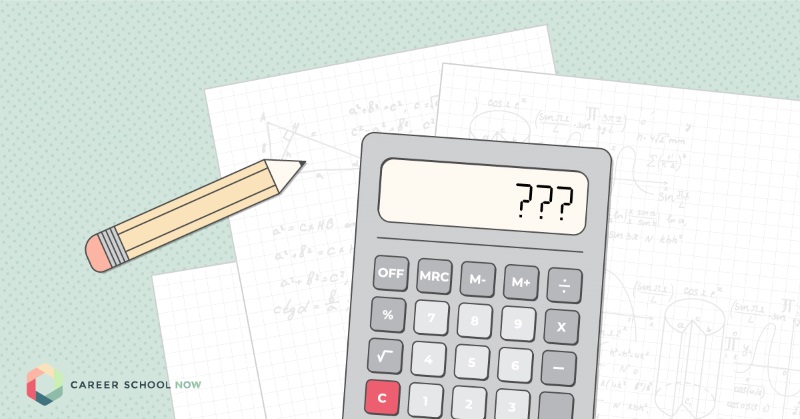
You hate math with every fiber of your being. Understandable—it's definitely not for everyone. You know it can be learned, but you’re not even remotely interested in going a step further than the basics. And you can already bet you'd be happier in a career you don't need much math for.
Well, here’s some good news. There are plenty of careers that require little to no math skills — while in training or at work. Many of them are medical professions, even. Read further for a list of some great careers that are math-free!
Careers you can train for in 6 months or less—(some require a little math)
Healthcare Careers With Minimal Math
We checked the 2020-2021 catalogs on schools' websites and can safely say: train for these careers, and you'll complete your program with very few math credits needed.
Medical and Healthcare Careers
The medical profession is packed with career variety, and there are quick medical certificates with good pay that are offered. Medical and healthcare careers are a popular path for many, and rightfully so. Between the high pay and the career ladder, it’s a great field to choose. Not only that, but some of the medical career choices have minimal math requirements. It’s a win-win!
- Nursing: Most licensed practical or vocational nursing programs only require 1 or 2 basic math courses. For example, in Fortis' practical nursing program, the only math class required is College Mathematics, a 101 level. You’ll use math daily, but it will not be comprised of complex equations.
- Dental Hygiene: As a dental hygienist, you won’t be using that much math. During your college program, you’ll only be taking some basic math classes. All-State Career School, for instance, has no math classes in its dental hygiene program courses.
- Acupuncturist: You won’t need any more math credits to become an acupuncturist. Most of your studies will be focused on anatomy, sciences, and different types of techniques.
- Medical transcriptionist: In training, you will learn spreadsheet and bookkeeping software, which comes with some formulas and equations. In CDE Career Institute's medical transcriptionist and insurance billing program, you won't have any math-specific classes.
- Medical lab technician: For a typical associate degree program, you’ll only need about two math courses. The medical lab technician program at Vista College comes with an intro to math course as well as Math for the Medical Lab Technician.
- Medical secretary: As a medical secretary student, you won’t need a ton of math. At the Pima Medical Institute, you'll take just one course of math fundamentals, for instance. The rest of your courses focus on running a doctor’s office.
- Phlebotomist: If you go through a trade school program, math won’t even be on your course syllabus. Arizona College is just one of the many that has no math in its medical assistant + phlebotomy program. However, if you attend community college, you’ll need to take basic college algebra, unless you test out during the placement exam.
More High-Paying Careers with Little to No Math
- Graphic design: Math isn’t something you’ll use a lot as a graphic designer. And if you do need it, programs you’ll use do it for you. As a graphic design student, you will need to take basic college math, and that’s about all. Your classes are going to be more geared toward theory, history, and general education.
- Massage therapy: There won’t be any math involved in your massage therapy training. You’ll take classes such as anatomy and physiology, business ethics, medical terminology, and learn about the modalities or types of massage. As a massage therapist, pay can increase depending on tips and industry.
- Teacher: If you go into a specialized field of teaching, such as high school English or social studies, then you’ll only need to take the core math classes. The rest of your focus will be on your major.
- Wind turbine technician: Classes in your wind turbine technician training program may include numbers surrounding electricity, but no math courses are required. In Pinnacle Career Institute's wind turbine tech program, the closest you get to math is Electricity & Power Generation.
- Hospitality: Hotel or restaurant management will not require you to have advanced levels of math. You will need you some business math and accounting, but you won’t have to worry about higher level math, which is a major relief.
- Interpreters and translators: Math isn’t going to be your focus when studying to be an interpreter or translator. You’ll be deep in the linguistics and culture of whichever language you’re studying. There will be the core math classes, but nothing more than that.
- Social worker: Math classes are rare for those going into social work. Mostly, your studies will be focused on a social work-related curriculum of research methods, behavior, and practice.
As a general rule of thumb, career-centered training certificate programs carry the least amount of math, simply because these don't include the general education credit hours needed in an associate or bachelor's degree.
If you’re not too terribly bothered by math, check out these interesting STEM fields you can head into.
Read about high paying trade school careers without much math.
More: